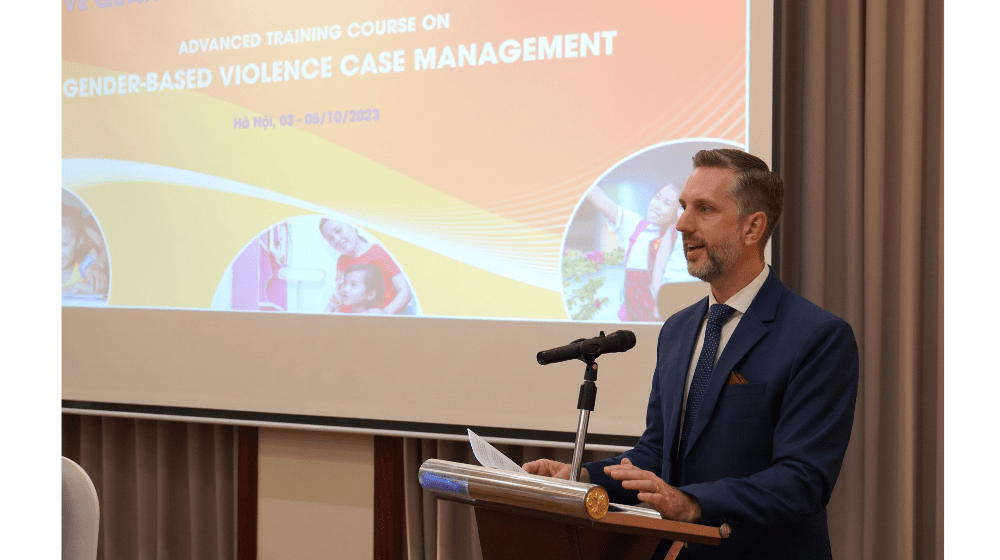- Representatives from the Ministry of Labour, Invalids and Social Affairs and Ministry of Culture, Sports and Tourism;
- Participants from the provinces of Quang Ninh, Thanh Hoa, Ha Tinh, Khanh Hoa, Da Nang, Hanoi and Ho Chi Minh City;
- UNFPA colleagues from the Asia Pacific Regional Office and Viet Nam Office
On behalf of UNFPA in Viet Nam, I am very pleased to welcome you all to this three-day advanced training to continue to build your capacity in managing gender-based violence cases.
Two weeks ago, I made my first business trip to Quang Ninh province as the new UNFPA Representative in Vietnam. I visited the One Stop Service Centre, the Anh Duong House (Ngôi nhà Ánh Dương). And last week I called at the office of the GBV hotline run by the Viet Nam Farmers’ Union, where I learnt that over the past 2 years, the hotline has received a huge number of calls, around 20,000, including from rural women and girls subject to violence, as well as callers asking for vital knowledge and information.
I was very impressed by the hard work done by the service providers at both the OSSC and the helpline call handlers. I would like to take this opportunity to congratulate them and all of you for your work and your devotion to the goal of reducing gender-based violence and domestic violence.
I’m now planning to visit the three other Anh Duong Houses in the near future, including the one in Da Nang next week, to witness with my own eyes the positive impact of the Anh Duong House. These outcomes demonstrate the strong partnerships between UNFPA, the Government of Viet Nam, particularly Ministry of Labour, Invalid and Social Affairs, and the Viet Nam Farmers’ Union.
Dear participants,
Although we have much progress to celebrate, we need to remind ourselves that according to the 2019 National Study on Violence against Women in Viet Nam, nearly 63% of married women aged 15-64 have experienced at least one form of physical, sexual, psychological or economic violence or controlling behaviour by their partner during their lifetime. Half of women who experienced physical and or/sexual violence by a husband kept silent. And over 90% of those experiencing violence did not seek any help.
We know that survivors of gender-based violence (GBV) often have to navigate a complex multi-sector response system. Consequently, many survivors simply give up on seeking support services. This further exposes them to violence.
For this reason, the One Stop Service Centre has been recognised as an effective model and UNFPA is honoured to introduce it to Viet Nam with the huge financial support from the Governments of the Republic of Korea, Japan and Australia.
Last week, at my meeting with the Minister of Labour, Invalids and Social Affairs, Mr. Dao Ngoc Dzung, I reaffirmed UNFPA’s support to the Ministry to standardise and scale up the One Stop Service Centre model. Today’s important training is part of that commitment.
Dear friends,
Gender-based violence case management is a structured method where trained case workers provide survivors with comprehensive support to ensure that the survivors are informed about all the options available to meet their needs. Effective survivor-centred case management offers an entry point specifically designed to address their immediate needs, including physical first aid, life-saving referrals, economic safety, access to justice and psychosocial services.
As an indispensable part of developing the one stop service centres, UNFPA has collaborated with key partners to provide capacity building for GBV-service providers, with a specific focus on case management. During the COVID-19 pandemic, UNFPA revised our GBV case management training content, drawing from international experiences to ensure the provision of essential services for GBV survivors amid an emergency situation. As a result, these training programmes have benefitted from the experiences of about 350 service providers and social workers in various areas across the country.
This three-day training is an advanced course in which you will be provided with fundamental knowledge and skills to manage GBV cases effectively, based on international guidelines and contextualised training tools. You will also analyse and discuss how to implement international guidelines in Viet Nam. In addition, guidance on working with other vulnerable groups, such as LGBTQIA+ survivors, survivors with disabilities, male survivors of violence, and survivors of human trafficking will be shared and discussed.
Last but not least, I would like to express my special thanks to Valentina Volpe, APRO GBV Technical Specialist for facilitating this training course and to you all for your commitment to ending gender-based violence. I wish you fruitful training days.
Thank you for your attention!
Xin cám ơn!


